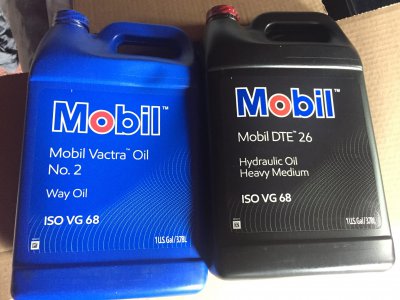Detergent oils do not attack brass/bronze shafts, the primary purpose of detergents are to keep particles in suspension so they can be removed by a filter, which requires a pressurized lubrication system. Almost all engine oils these days have a detergent, one reason why they are a poor choice for splash lubrication systems. Multi-viscosity oils are designed to operate over a wide range of temperatures, so one will see a range of rated viscosity such as gear oil 75W90 or motor oil 5W30. Extreme pressure (EP) anti-wear additives can damage yellow metals, softer materials such as clutch packs. etc. Most EP additives these days are inactive at lower temperatures and need heat to be activated. Oils are also designed for specific applications, so something like a limited slip differential oil has very different properties then standard gear oil of the same viscosity. As pointed out by others, in the US we have SAE viscosity index which is a bit mixed up as to the application and the viscosity. The rest of the world primarily uses the ISO system which is a single viscosity nomenclature. Many oils these days will list there ISO viscosity in addition to their SAE, but a comparison chart is worth noting. So viscosity wise an ISO 68 oil is equivalent to a SAE 20 motor oil and a 80W gear oil.
Many of the "gear oils" for machinery such as lathes and mills are based on mineral oil, and typically are a single weight viscosity. The higher the operating speed of the bearings/gears usually requires a lighter weight (lower ISO/SAE) oil. The type of gears and if there are any hydraulic components/clutch packs also factor into the oil properties and additive packs. Typically for manual mills and lathes, gear oil and hydraulic oils of the same viscosity are used pretty much interchangeably. There are small difference between the two, but not something that would make a difference in the lubricating properties of the oils. Some oils are also designed to emulsify water contamination while others are designed to separate it out, almost all oils have anti-rust and anti-foaming agents. True synthetic oils have a much more uniform molecule size are are less prone to degradation and have a more constant viscosity index over a wide temperature operating range. As an example in air piston compressors the rated change time for a mineral based oil is ~200 hours, where a synthetic oil is around 1000-2000 hours. So if you have a high usage compressor, it makes sense to use a synthetic oil, but the oil still needs to be changed at regular intervals (6-12 months) due to water/particle contamination.
So specific to gear head mills, any oil is better than no oil, and in general the design (straight cut gears) and operating stress of a gear head mill is low. So just about any non-detergent oil of the proper viscosity will work for a long time. There is no "best" oil for this application, other than having the proper viscosity. Mobil just seems to be the most frequently sited oil these days were older manuals seemed to have sited Shell oils, and is is synonymous with equivalent oils of the same viscosity/overall characteristics. These days Mobil ISO 68 oils that would be used would be the DTE 26 hydraulic oil and the Heavy-Medium gear oil.
So now for a bit of the finer details from my own experience with gear head mills and oils having had one in the past. As indicated any good gear/hydraulic oil without EP additives will work quite well, and with regular oil changes (at least annually) you should see no differences between oil brands. The factory oil in most gear heads should be changed probably after the first 50 hours of use if not sooner. Most lower priced gear head mills come with probably the cheapest crappiest oil possible and often there is a lot of casting residue as well as metal particulate crap in there. If your gear head gets hot at the higher RPM's and/or you plan on using it at higher then stock RPM, then I would recommend a synthetic gear oil. I switched my gear head mill to synthetic after being broken in, I picked up 100 RPM top speed (2900 -> 3000 RPM), had significantly less foaming, and the head ran significantly cooler. The difference was very noticeable. I ended up using Amsoil Marine 75W90 gear oil, which although is designed for high speed marine drives and high gear pressures, will not damage yellow metals.
Shop AMSOIL Synthetic Marine Gear Lube 75W-90 at AMSOIL. Find premium synthetic oil, filters and more online. Fast, free shipping available.

www.amsoil.com
Mobil dte heavy medium equivalent | Mobil DTE heavy medium cross reference | Hydraulic oil cross reference chart
DTE Heavy = ISO
100
DTE Heavy Medium = ISO
68
DTE Medium = ISO
46
DTE Light = ISO
32
Brand Hydraulic Oil ISO VG 32 Hydraulic Oil ISO VG 46 Hydraulic Oil ISO VG 68
Mobil DTE 24 Light DTE 25 Medium DTE 26 Heavy
Shell Tellus 32 Tellus 46 Tellus 68
Chevron AW Hydraulic Oil 32 AW Hydraulic Oil 46 AW Hydraulic Oil 68
Exxon Humble Hydraulic H32 Humble Hydraulic H46 Humble Hydraulic H68
Texaco Rando HD 32 Rando HD 46 Rando HD 68
Sinopec AW 32 Hydraulic Oil AW 46 Hydraulic Oil AW 68 Hydraulic Oil
Castrol Hyspin 32 Hyspin 46 Hyspin 68
View attachment 325911



